Spearmint tea eases your stomach discomfort thanks to its powerful blend of natural compounds. It contains carvone, which relaxes digestive muscles, and menthol, providing a soothing cooling effect. The tea's antispasmodic properties help reduce cramps, bloating, and gas. Its anti-inflammatory and antibacterial effects combat gut irritation and harmful bacteria. Spearmint also stimulates bile production, aiding digestion and fat breakdown. The tea's antioxidants protect your stomach lining and promote healing. Regular consumption can improve overall digestive comfort and manage symptoms of conditions like IBS. Discover how this simple herbal remedy can transform your digestive health.
Key Takeaways
- Spearmint tea contains antispasmodic compounds like carvone that relax digestive tract muscles, easing cramps and discomfort.
- Its anti-inflammatory properties, primarily from rosmarinic acid, reduce gut inflammation and support overall digestive health.
- Menthol in spearmint provides a cooling sensation, alleviates pain, and relaxes smooth muscles in the gastrointestinal tract.
- Spearmint tea stimulates mucus production, enhancing protective barriers in the digestive tract and promoting cellular repair.
- It has carminative effects, helping to reduce gas and bloating, which are common causes of stomach discomfort.
Spearmint's Natural Healing Properties

Why is spearmint tea so effective for soothing stomach discomfort? The answer lies in spearmint's natural healing properties. This aromatic herb contains a variety of compounds that work together to alleviate digestive issues.
Spearmint's primary active ingredient is carvone, a compound responsible for its distinctive flavor and aroma. Carvone has antispasmodic properties, which help relax the muscles in your digestive tract, reducing cramps and bloating.
Additionally, spearmint contains rosmarinic acid, a powerful antioxidant that can reduce inflammation in your gut.
You'll also find menthol in spearmint, though in lower concentrations than its cousin, peppermint. Menthol has a cooling effect that can soothe an upset stomach and reduce nausea.
Spearmint's antibacterial properties may help combat harmful bacteria in your digestive system, potentially easing symptoms of indigestion.
The herb's high content of flavonoids and phenolic acids contributes to its overall anti-inflammatory effects. These compounds can help protect the lining of your stomach and intestines, reducing irritation and promoting healing.
Digestive Benefits of Spearmint

Spearmint tea can offer you significant digestive benefits, thanks to its antispasmodic effects.
You'll find that this soothing brew helps relax your digestive tract muscles, potentially easing stomach cramps and discomfort.
Additionally, spearmint tea may provide relief from gas and bloating, making it a natural remedy for common digestive issues.
Antispasmodic Effects
Soothing digestive discomfort is one of spearmint tea's most notable benefits. Its antispasmodic effects play a significant role in easing stomach upset and calming your digestive system. When you drink spearmint tea, it helps relax the smooth muscles in your gastrointestinal tract, reducing spasms and cramps that can cause pain and discomfort.
The menthol in spearmint is primarily responsible for these antispasmodic properties. It works by blocking calcium channels in your intestinal cells, which decreases muscle contractions. This action can provide relief from various digestive issues, including bloating, gas, and abdominal pain.
You'll find that spearmint tea's antispasmodic effects can be particularly helpful if you suffer from irritable bowel syndrome (IBS). It may alleviate symptoms like cramping and diarrhea by regulating intestinal contractions.
Additionally, the tea's soothing properties can help reduce nausea and vomiting, making it a go-to remedy for motion sickness or pregnancy-related morning sickness.
Gas and Bloating Relief
Discomfort from gas and bloating can turn a pleasant day into a miserable experience. Spearmint tea offers a natural solution to these common digestive issues. When you drink spearmint tea, you're leveraging its carminative properties, which help reduce gas formation in your digestive tract and ease the expulsion of existing gas.
The menthol in spearmint relaxes the smooth muscles of your gastrointestinal system, allowing trapped gas to move more freely and reducing bloating. This action also helps to alleviate the pressure and discomfort associated with a bloated stomach.
Additionally, spearmint tea can stimulate the production of bile, which aids in the breakdown of fats and improves overall digestion, potentially reducing the likelihood of gas formation.
You'll find that regularly consuming spearmint tea can help prevent the buildup of gas and minimize bloating episodes. It's particularly effective when consumed after meals or when you're experiencing digestive discomfort.
Antispasmodic Effects on Stomach
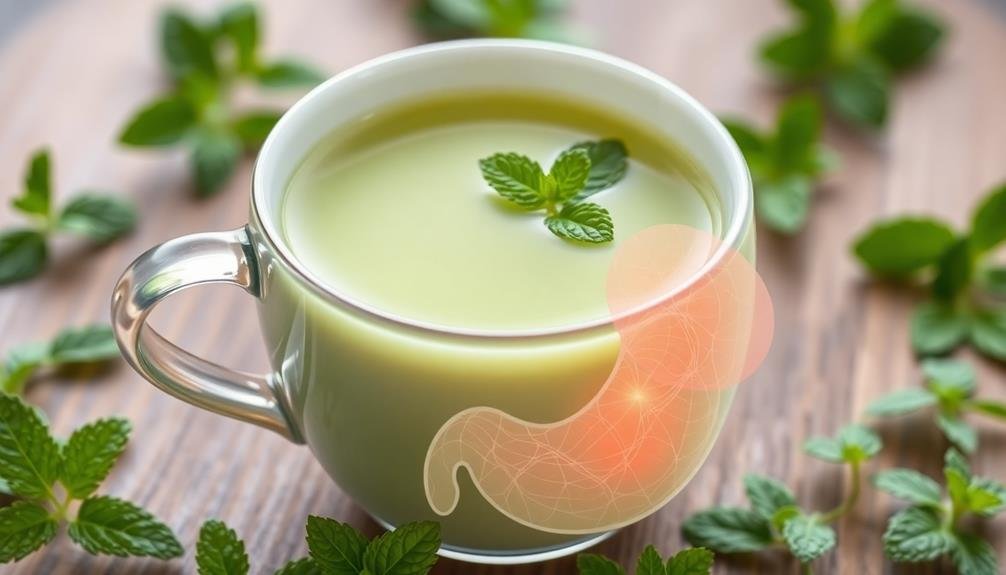
Spearmint tea's antispasmodic effects can help ease your stomach discomfort.
Its muscle-relaxing properties work to soothe the smooth muscles in your digestive tract, potentially reducing intestinal cramping.
You may find relief from stomach spasms and associated pain by drinking this aromatic herbal tea.
Muscle Relaxation Properties
Relax your stomach muscles with the power of spearmint tea. This aromatic brew contains compounds that act as natural muscle relaxants, particularly beneficial for your digestive system. When you consume spearmint tea, it helps ease tension in your stomach and intestinal muscles, reducing cramping and discomfort.
The primary active ingredient responsible for this muscle-relaxing effect is menthol. It works by blocking calcium channels in muscle cells, which prevents them from contracting excessively. This action can provide relief from stomach spasms and promote smoother digestion. Additionally, spearmint contains other beneficial compounds like carvone and limonene, which contribute to its overall soothing properties.
You'll find that drinking spearmint tea can help alleviate symptoms associated with irritable bowel syndrome (IBS) and other gastrointestinal issues. It's particularly effective in reducing bloating and gas, as the relaxed muscles allow for easier passage of food and air through your digestive tract.
The tea's muscle-relaxing properties extend beyond just your stomach, potentially easing tension in your esophagus and helping with acid reflux symptoms. Regular consumption of spearmint tea can lead to improved overall digestive comfort and function.
Reducing Intestinal Cramping
Soothe your intestinal woes with spearmint tea's powerful antispasmodic effects. This aromatic brew can greatly reduce intestinal cramping, offering relief from digestive discomfort. Spearmint contains compounds that relax the smooth muscles in your gastrointestinal tract, easing spasms and reducing pain.
When you drink spearmint tea, it works to calm overactive intestinal muscles. This action helps alleviate symptoms associated with conditions like irritable bowel syndrome (IBS) and general digestive upset. The tea's natural antispasmodic properties target the root cause of cramping, providing more than just temporary relief.
You'll find that regular consumption of spearmint tea can lead to fewer instances of intestinal distress. It's particularly effective in reducing bloating, gas, and the sharp pains often experienced during digestive issues. The tea's soothing effect extends throughout your digestive system, promoting overall gastrointestinal health.
For best results, drink a cup of spearmint tea when you feel cramping coming on, or as a preventative measure before meals known to trigger discomfort. You can also incorporate it into your daily routine to maintain digestive balance and reduce the frequency of intestinal spasms.
Calming Menthol in Spearmint
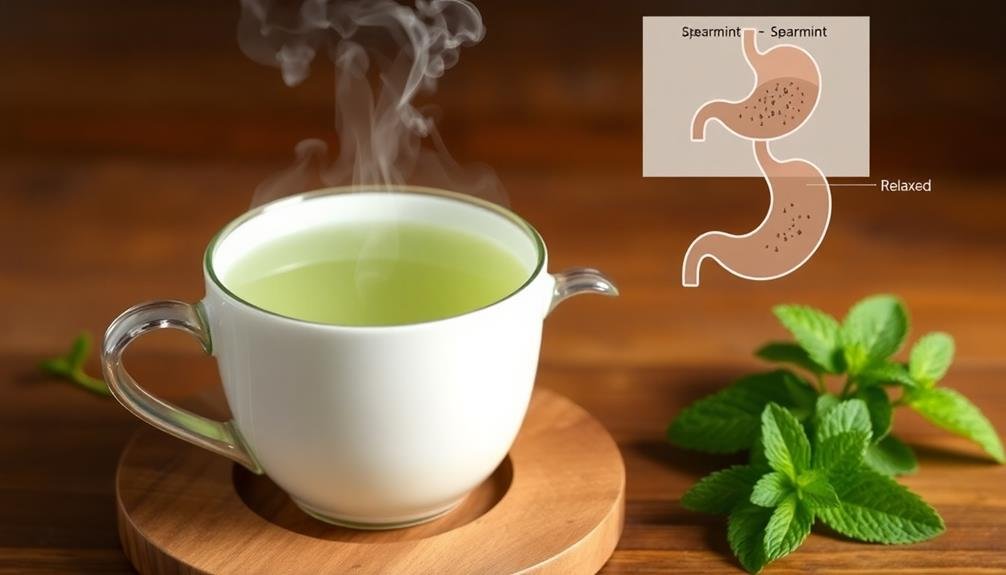
Menthol, the active compound in spearmint, plays an essential role in its stomach-calming properties. When you consume spearmint tea, the menthol interacts with your digestive system, providing a cooling and soothing sensation. This effect can help alleviate various forms of stomach discomfort, including nausea, bloating, and general unease.
The calming nature of menthol stems from its ability to activate cold-sensitive receptors in your body. This activation can lead to a reduction in pain sensations and muscle spasms in your digestive tract.
Additionally, menthol has been shown to have mild analgesic properties, which can also contribute to its stomach-soothing effects.
You'll find that the menthol in spearmint tea can also promote relaxation of the smooth muscles in your gastrointestinal tract. This relaxation can help ease tension and reduce cramping, leading to improved digestion and less discomfort.
Moreover, menthol's anti-inflammatory properties may help reduce inflammation in your digestive system, potentially alleviating symptoms associated with conditions like irritable bowel syndrome or indigestion.
Inflammation Reduction in Digestive Tract

Spearmint tea contains powerful anti-inflammatory compounds that can help soothe your digestive tract.
These compounds work to reduce inflammation in the mucosal lining of your stomach and intestines, potentially easing discomfort and promoting healing.
Anti-inflammatory Compounds
For centuries, spearmint has been prized for its anti-inflammatory properties. The key to its effectiveness lies in its rich array of anti-inflammatory compounds. These natural substances work together to soothe your irritated digestive tract and reduce inflammation throughout your body.
Spearmint contains several potent anti-inflammatory compounds, including rosmarinic acid, limonene, and carvone. These substances help inhibit the production of inflammatory molecules in your body, effectively calming your stomach and easing discomfort.
When you drink spearmint tea, you're introducing these beneficial compounds directly into your digestive system, where they can quickly get to work.
The anti-inflammatory effects of spearmint tea can evoke:
- Relief from persistent stomach pain
- A sense of comfort and relaxation in your gut
- Renewed energy as your body focuses less on fighting inflammation
- Confidence in managing digestive issues naturally
- Hope for long-term digestive health improvement
Soothing Mucosal Lining
A key benefit of spearmint tea is its ability to soothe the mucosal lining of your digestive tract. When you drink spearmint tea, its active compounds work to reduce inflammation and irritation in your stomach and intestines. This soothing effect can help alleviate various digestive issues, including bloating, cramps, and general discomfort.
The mucosal lining acts as a protective barrier in your digestive system. Spearmint tea supports this barrier by:
| Benefit | Mechanism |
|---|---|
| Mucus production | Stimulates mucus secretion |
| Cellular repair | Promotes epithelial cell regeneration |
| Antioxidant action | Neutralizes free radicals |
| pH balance | Helps maintain ideal acidity levels |
| Microbial balance | Supports beneficial gut bacteria |
Spearmint vs. Other Mint Varieties

Comparing spearmint to other mint varieties reveals some key differences in flavor and potential benefits. While peppermint is known for its strong, cooling sensation, spearmint offers a milder, sweeter taste that's often more palatable for those with sensitive stomachs.
This gentler profile makes spearmint tea an excellent choice for easing digestive discomfort without overwhelming your senses. Spearmint contains lower levels of menthol compared to peppermint, which may be beneficial if you're prone to acid reflux or heartburn.
The reduced menthol content can help soothe your stomach without triggering these issues. Additionally, spearmint's unique composition of antioxidants and compounds like limonene and carvone contribute to its stomach-calming properties.
Consider these emotional benefits of choosing spearmint tea:
- Comforting warmth that embraces your senses
- Gentle relief that doesn't feel like medicine
- A moment of tranquility in your busy day
- Connection to nature's healing powers
- Confidence in choosing a natural remedy
While other mint varieties like apple mint or chocolate mint may offer interesting flavors, they don't typically provide the same level of stomach-soothing benefits as spearmint.
Preparing Effective Spearmint Tea
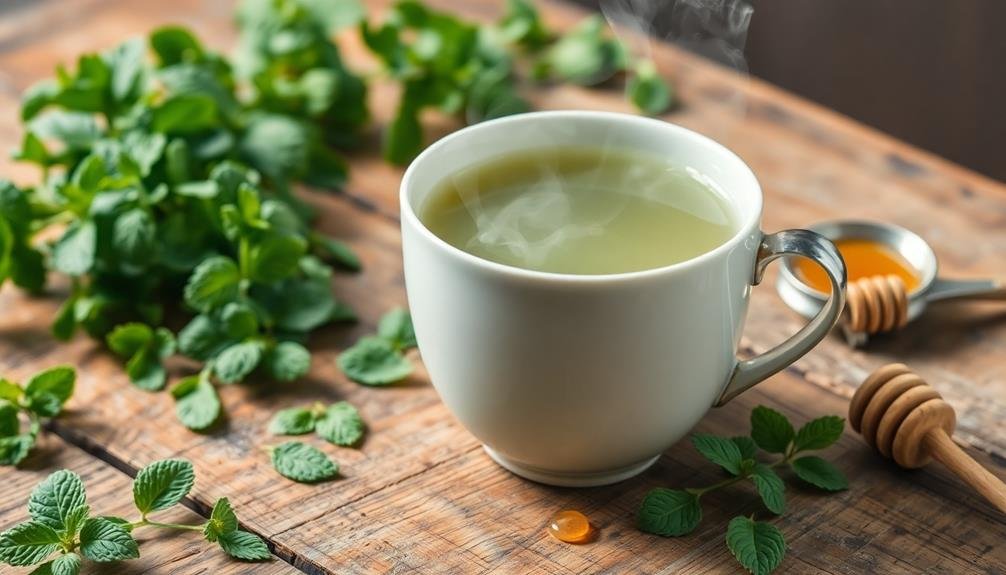
Now that you've learned about spearmint's unique benefits, let's focus on how to prepare the perfect cup of spearmint tea for maximum effectiveness.
Start by selecting high-quality spearmint leaves, either fresh from your garden or dried from a reputable source. For fresh leaves, use about 5-7 leaves per cup of water. If using dried leaves, measure out 1-2 teaspoons per cup.
Bring water to a near-boil (about 200°F or 93°C) and pour it over the leaves in a cup or teapot. Allow the tea to steep for 5-7 minutes, depending on your desired strength. Longer steeping times will extract more of the beneficial compounds but may result in a stronger flavor.
To enhance the tea's stomach-soothing properties, consider adding a slice of fresh ginger or a pinch of fennel seeds. These ingredients can complement spearmint's effects on digestion.
Strain the tea and drink it while it's still warm for the best results. You can enjoy up to 3-4 cups of spearmint tea daily to help alleviate stomach discomfort and promote overall digestive health.
Combining Spearmint With Other Herbs

Herbalists have long recognized the power of combining spearmint with other herbs to enhance its stomach-soothing properties. By pairing spearmint with complementary herbs, you can create a more potent and effective remedy for digestive issues. Some popular combinations include spearmint with chamomile for relaxation, ginger for nausea relief, and peppermint for added cooling effects.
When blending spearmint with other herbs, consider the following emotional benefits:
- Comfort: A warm cup of spearmint blend can provide a sense of comfort and care.
- Tranquility: Certain herb combinations can promote calmness and reduce stress.
- Rejuvenation: The right blend can leave you feeling refreshed and energized.
- Harmony: Balanced herb combinations can foster a sense of inner balance.
- Hope: A well-crafted herbal blend can inspire optimism for improved well-being.
To create your own spearmint blend, start with a base of spearmint leaves and experiment with small amounts of other herbs.
You'll want to taste-test your blend to ascertain the flavors complement each other well.
Scientific Studies on Spearmint Tea

Research into the therapeutic benefits of spearmint tea has grown in recent years, shedding light on its potential to alleviate stomach discomfort. Several studies have focused on spearmint's impact on digestive issues, with promising results.
A 2019 study published in the Journal of Medicinal Food found that spearmint tea consumption considerably reduced symptoms of functional dyspepsia, including bloating and stomach pain. The researchers attributed this effect to spearmint's antispasmodic properties, which help relax the smooth muscles in the digestive tract.
Another study in the European Journal of Pharmacology explored spearmint's anti-inflammatory effects. It revealed that compounds in spearmint, such as rosmarinic acid and flavonoids, can reduce inflammation in the gastrointestinal system, potentially easing stomach discomfort.
You'll also find evidence of spearmint's carminative properties in scientific literature. A 2018 review in Phytotherapy Research highlighted spearmint's ability to reduce gas and bloating, making it an effective remedy for indigestion.
While more research is needed to fully understand spearmint tea's mechanisms, these studies provide a solid foundation for its use in managing stomach discomfort.
As you consider natural remedies, keep in mind that spearmint tea's benefits are backed by growing scientific evidence.
Dosage and Consumption Guidelines
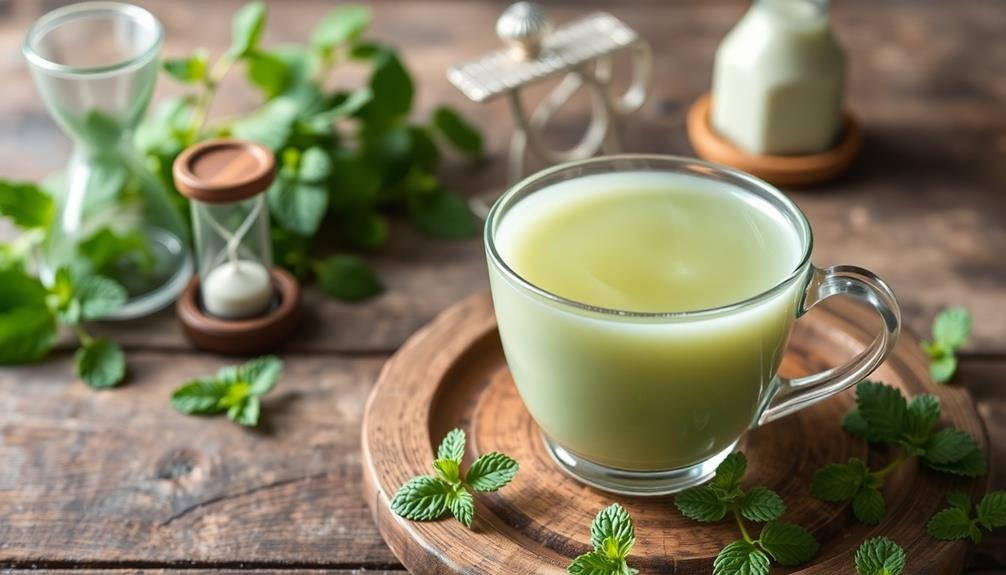
When considering spearmint tea for stomach discomfort, it's important to understand proper dosage and consumption guidelines. Most experts recommend drinking 1-3 cups of spearmint tea daily, with each cup containing about 1-2 grams of dried spearmint leaves steeped in hot water for 5-10 minutes. It's best to start with a lower dose and gradually increase if needed.
To maximize the benefits of spearmint tea for stomach relief, follow these guidelines:
- Drink it between meals to avoid interfering with digestion
- Consume it warm, not scalding hot, to soothe your stomach
- Steep the tea covered to retain beneficial oils
- Avoid adding milk or sugar, which may counteract its effects
- Listen to your body and adjust consumption as needed
If you're pregnant, nursing, or taking medications, consult your healthcare provider before incorporating spearmint tea into your routine.
While generally safe, excessive consumption may lead to side effects like headaches or nausea.
Potential Side Effects
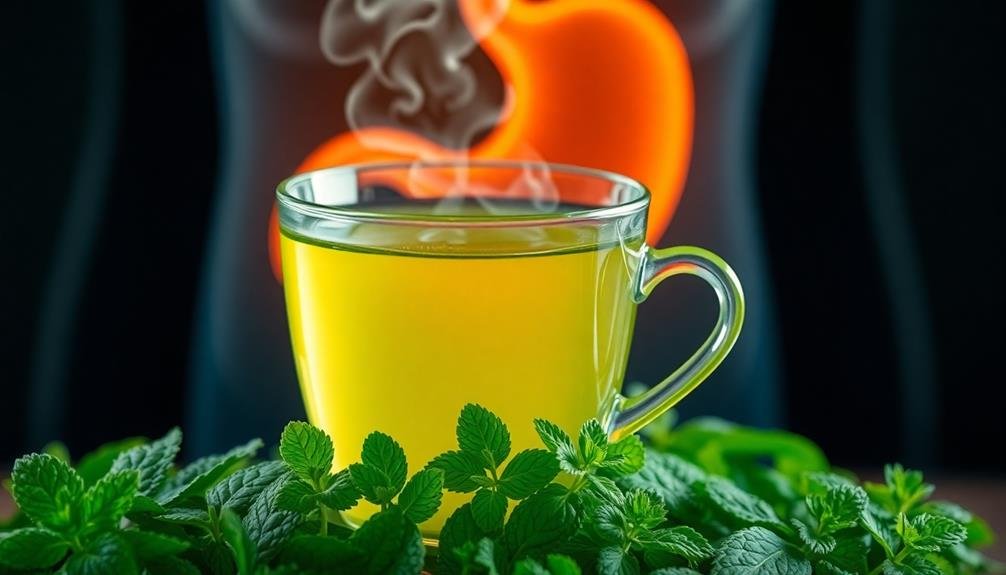
While spearmint tea is generally safe for most people, it's important to be aware of potential side effects. You may experience heartburn or acid reflux if you consume large quantities, as spearmint can relax the lower esophageal sphincter. If you're prone to these conditions, it's best to limit your intake or avoid spearmint tea altogether.
Some people may develop allergic reactions to spearmint, resulting in symptoms like itching, hives, or difficulty breathing. If you notice any of these signs, stop drinking the tea immediately and seek medical attention.
Spearmint tea can interact with certain medications, particularly those that affect liver enzymes. It may interfere with the effectiveness of drugs like cyclosporine or hormonal treatments. If you're taking any medications, consult your healthcare provider before adding spearmint tea to your routine.
Pregnant women should exercise caution, as excessive consumption of spearmint tea may affect hormone levels. While moderate amounts are likely safe, it's best to consult your doctor before using it during pregnancy or breastfeeding.
Lastly, some individuals may experience headaches or dizziness when consuming spearmint tea, especially in large quantities or on an empty stomach.
Frequently Asked Questions
Can Spearmint Tea Help With Acid Reflux or GERD Symptoms?
Yes, spearmint tea can help with acid reflux and GERD symptoms. It's known to reduce stomach acid and relax the lower esophageal sphincter. You'll find it soothes discomfort and may prevent reflux episodes when consumed regularly.
Is Spearmint Tea Safe for Pregnant or Breastfeeding Women?
You should consult your healthcare provider before drinking spearmint tea while pregnant or breastfeeding. Although it's generally considered safe in moderation, some studies suggest it may affect hormone levels. It's best to err on the side of caution.
How Long Does It Take for Spearmint Tea to Relieve Stomach Discomfort?
You'll usually feel relief from stomach discomfort within 15-30 minutes after drinking spearmint tea. It's quick-acting, but individual responses may vary. For best results, sip it slowly and give your body time to absorb its soothing properties.
Can Children Drink Spearmint Tea for Stomach Issues?
You can give children spearmint tea for stomach issues, but it's best to consult a pediatrician first. If approved, use weak tea and limit intake. Always monitor your child's reaction and stop if any adverse effects occur.
Does Spearmint Tea Interact With Any Medications or Medical Conditions?
You should be cautious when drinking spearmint tea if you're taking certain medications. It can interact with drugs like antacids, blood thinners, and hormone therapies. If you have liver or kidney issues, consult your doctor before consuming it regularly.
In Summary
You've learned how spearmint tea can be a natural remedy for stomach discomfort. Its antispasmodic properties, menthol content, and anti-inflammatory effects work together to soothe your digestive system. Remember to follow dosage guidelines and be aware of potential side effects. While scientific studies support its benefits, it's always best to consult your healthcare provider before using it as a treatment. Enjoy the calming effects of spearmint tea as part of your digestive health routine.





Leave a Reply